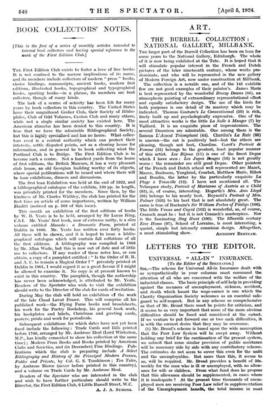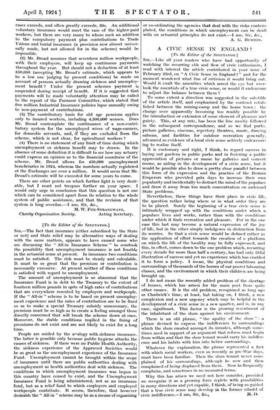LETTERS TO THE EDITOR.
UNIVERSAL "ALL-IN " INSURANCE.
[To the Editor of the SPECTATOR.] Sm,—The scheme for Universal All-in Insurance dealt with so sympathetically in your columns must command the, attention of all who are concerned with the welfare of the industrial classes. The basic principle of self-help in providing against the menaces of unemployment, sickness, accident, and death which haunt the wage-earner is one which the Charity Organisation Society welcomes as an essential safe- guard to. self-respect. But in any scheme so comprehensive as that of Mr. Broad there must be points for criticism, and it seems to us very important that some of the more obvious difficulties should be faced and considered at the outset. If we venture to put forward one or two such difficulties, it is with the earnest desire that they may be overcome.
(1) Mr. Broad's scheme is based upon the wide assumption, that the Poor Law System will be swept away. Without holding any brief for the continuation of the present system, we submit that some similar provision of public assistance will be necessary side by side with any contributory scheme. The estimates do not seem to cover this even for the unfit and the unemployables. But more than this, it seems to us, will be required. Mr. Broad provides a benefit of 80s. weekly for the man who is ill or unemployed, with no allow- ance for wife or children. From what fund does he propose that this allowance should be supplemented, in cases where it is inadequate ? At the present time thousands of unem- ployed men are receiving Poor Law relief in supplementation of the Unemployment benefit, the total income in most
cases exceeds, and often greatly exceeds, 80s. An additional voluntary insurance would meet the case of the higher-paid workers, but there are very many to whom such an addition to the compulsory payment plus contributions to Trade Unions and burial insurance (a provision now almost univer- sally made, but not allowed for in the scheme) would be impossible.
(2) Mr. Broad assumes that seventeen million workpeople, with their employers, will keep up continuous payments throughout the year. But should not a deduction of at least 850,000 (accepting Mr. Broad's estimate, which appears to be a low one judging by present conditions) be made on account of persons actually drawing sickness and unemploy- ment benefit ? Under the present schemes payment is suspended during receipt of benefit. If it is suggested that payments will be made voluntarily attention may be called to the report of the Parmoor Committee, which stated that five million Industrial Insurance policies lapse annually owing to non-payment of contributions.
(3) The contributory basis for old age pensions applies
only to insured workers, including 4,500,000 women. Does Mr. Broad contemplate the continuance of a non-contri- bUtory system for the unemployed wives of wage-earners, for domestic servants, and, if they are excluded from the scheme, which is not clear, for agricultural workers ?
(4) There is no statement of any limit of time during which unemployment or sickness benefit may be drawn. In the absence of some definition it is difficult to see how any actuary could express an opinion as to the financial soundness of the scheme. Mr. Broad allows for 450,000 unemployment beneficiaries in 1924, whereas the numbers actually registered at the Exchanges are over a million. It would seem that Mr. Broad's estimate will be exceeded for some years to come.
There are other points on which further light is very desir- able, but I must not trespass further on your space. I would only urge in conclusion that this question is not one which can be considered apart from its relation to the whole system of public assistance, and that the revision of that system is long overdue.—I am, Sir, &c.,
M. W. FOX-STRANGWAYS, Charity Organisation Society. Acting Secretary.



























































 Previous page
Previous page